Ashley Saupe and The Sharp End Podcast
Posted by Jeremy Windsor on Mar 25, 2022
Since 2015, Ashley Saupe has produced more than 70 episodes of "The Sharp End" podcast. Each one focuses upon a life threatening event in the mountains and encourages those involved to talk freely about their experience. As Ashley says, "I believe we all need to shift our way of thinking about accidents and intentionally create a culture that allows people to share their stories, judgement, shame and guilt-free". We asked Ashley to tell us about the origins of the podcast and what she's learnt along the way.
Thanks Ashley for talking to me. Can I start by asking you to tell us a little about your background and what made you start "The Sharp End"?
My background is in Outdoor Education. I graduated with a BA in Outdoor Leadership from Sheldon Jackson College in Sitka, Alaska on Baranof Island. After that, I did a year of AmeriCorps in Juneau. I started the Ocean Enrichment Program for K-2 teaching hands-on nature education specifically geared towards the ocean and the sea life that resides in it. Juneau is a coastal community and many of the kiddos there haven't even been to the beach! I'm proud to say that the program is still alive and well today after 12 years!
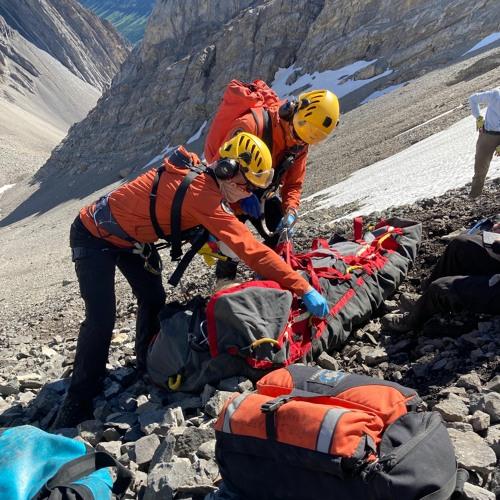
In Episode 66 "Broken Neck On Mt Rae..." Ashley was able to talk to climbers and rescuers about the fall suffered by Vi and the protacted helicopter rescue that ensued. Rarely is it possible to record such a range of different perspectives of a single incident. The Sharp End is able to do this over and over again - an invaluable resource!
After that, I started working for the Outward Bound School instructing backpacking and mountaineering courses. I've always loved being outside and sharing that passion with others. I worked for Outward Bound for 9 years and within those nine years, I learned to really pay attention to near misses and reporting accidents. This is ingrained in the Outward Bound culture. The school really prides itself on learning and growth through near misses and incidents within the institution. I found that admirable and learned that I could even gain a lot from learning from mistakes from my personal life in climbing and mountaineering. I also read the annual books "Accidents in North American Climbing" by the American Alpine Club religiously and always learned so much from those publications. That's when I had the idea to start the Sharp End Podcast. I was bumping down the road in my van that I lived in driving to a climbing crag. I was thinking about how that book should become a podcast and then I thought, "I should make it a podcast!" And that's what I did.
Can you talk us through the making of one of your episodes? How do you make contact with your subjects?
Well it's different now than it was at the beginning. At the beginning, it took a lot of time and effort to find guests for the show. No one wanted to be on the show because no one wanted to be vulnerable and share their story with the climbing community. I could ask 5 people if they'd be on the show and 4 of the 5 would decline. Now, 6.5 years later, I have more submissions than I can produce! I have put a lot of intention to shift the way our outdoor community looks at accidents. Instead of shaming and blaming the folks who have been in an outdoor accident, I aim to inspire people to listen and learn. Within that, there is growth.
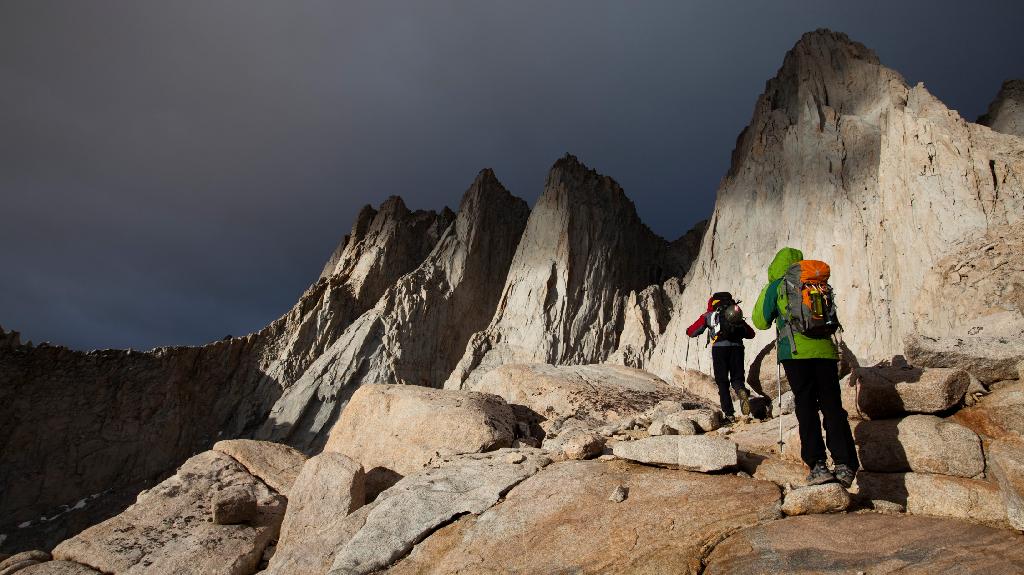
Brilliant storytelling also plays an important part in The Sharp End's appeal - listen to Jean and Ken describing their falls on Mt Whitney in Episode 63 "Epic On Mt Whitney"
How would you say the podcast has changed over the years? Do you find there is now a greater willingness to speak openly?
Yes, I think it's changed a lot with what I said in the previous question. People are so much more willing to share now than before. It really is amazing and I am so honoured to be able to sit with these folks and listen intently to what they have to say with no judgement. I want to give them the space to share their story with the world and that's healing for most of my guests.
There is a real willingness to share personal and sometimes life threatening experiences on your podcast. I suspect you've thought very carefully about how you've been able to do that. Can you tell us about your approach?
It's patience, kindness, compassion and empathy for what they went through emotionally, mentally and physically. These are generally inherently risky activities and people are dealing with so much more when there is an accident involved. This is trauma we are dealing with, and it's their trauma that my guests are willing to share with the listeners of the show with no other reason than to hopefully minimize a potential similar future accident from occurring. How selfless of them! My approach is simply to listen and try and understand, give space and pause when needed, and most importantly, stay compassionate.
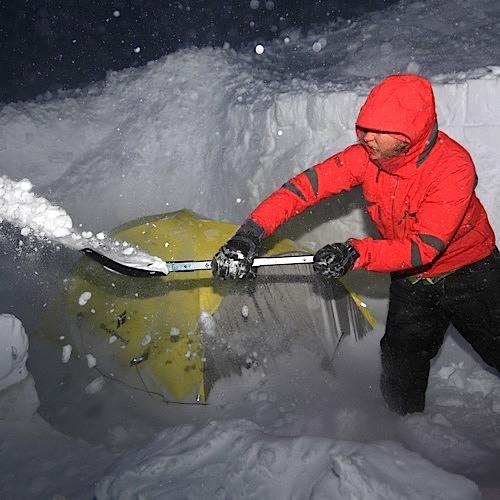
Ashley also talks freely about her own experience. In Episode 47 "Deadly Gas..." Ashley talks about her own experience of carbon monoxide poisoning and talks to Denali Park Ranger Dave Weber how close she was to death
Have there been occasions when you are unable to include something you've been told? Do you feel a "duty of care" towards those involved?
No matter how long the initial interview is, I will edit each episode down to about 30-40 minutes. So yes, things get cut from the final edit. What gets cut? Mostly a lot of "umms" and "uhhs," curse words, and repetitive information. Sometimes if it's an accident that involves multiple parties and there is blaming or shaming of another party, I'll cut that out too. I'll also cut out subjective information. I try to keep it factual and objective on most of my episodes but I can't always do that. I want to respect people's privacy, experience and healing. So ... in a roundabout way, yes, there are times I am unable to include something I've been told.
Amongst the many incidents you've reported do you sense any patterns emerging? Do you find it striking how vivid the memories of the victims are? Or the long lasting efforts these incidents have?
The common theme I see through producing all of the episodes so far is complacency. Yes, my guests are often so descriptive and it's really powerful. There are so many episodes I can remember listening to my guests with this feeling like I am there with them. It's funny how time seems to slow down when shit is hitting the fan. A lot of my guests are still suffering emotionally or mentally from their incidents as well. They're not only dealing with a physical injury, but now they are also dealing with a psychological injury aka a stress injury. Those don't go away overnight.
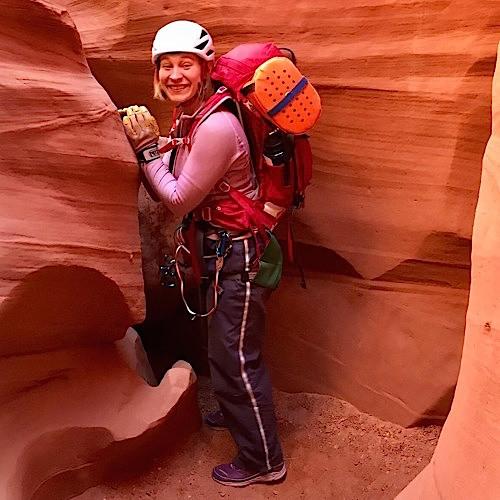
In February 2020 four friends were canyoning in Angel Cove Canyon. Sadly one member died whilst rappeling. In Episode 54 "A Tribute To Fiona" the survivors describe the incident and recall the life of their friend. A thoughtful and incredibly moving account of loss
Is there any one episode that really stands out for you?
"A Tribute to Fiona" was so powerful. She was described by her friends as a very smart, capable, experienced and humble female canyoneer and as she sat there on that perch soaking in the very last bit of sunlight as it moved past the canyon wall, that was how she was remembered by her friends. Someone so experienced and dialled as Fiona, even she can have an accident. That's tragic. Her friends watched her fall to her death and there wasn't anything they could do except try to resuscitate her.
My live interview with the infamous Charlie Sassara where he talks about his and Jack Tackle's attempt on Mt Logan was incredible too. I did the interview in my home town in Anchorage Alaska in this small little local outdoor store. It was super fun. Charlie's dad was there, the heli pilot and parajumper that rescued the guys showed up, my mom and sisters were there and even Evan Philips who produces my favourite podcast, the Firn Line was there! It was just a hoot and it was a real pleasure to chat with Charlie. He's so approachable and a really great story teller, plus that story is insane. I can't believe those guys survived.
Do you think there are other ways to get your important messages out there? Is there an audience that you think you're missing?
I'm sure there is. I've been threatening to create a YouTube channel and start interviewing people with video as well as audio to reach the YouTube audience but honestly, I just don't have the time right now. And I don't have any experience editing video. That will be a massive learning curve that I just don't have the capacity for right now. I produce this show in my "spare" time in between work contracts. This is not my full time job. This is a side passion project that I do for my guests and my listeners. One day I hope to make it full time and then I can focus more on reaching a broader audience and honing in on key messages.
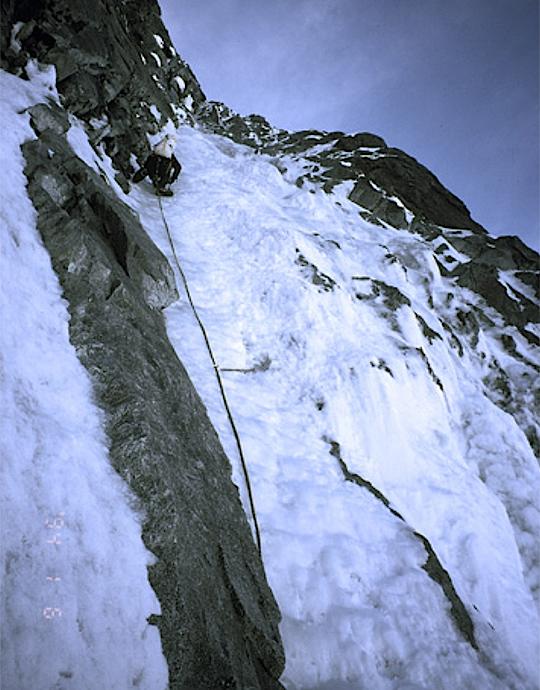
In a live interview with Jack Tackle and Charlie Sassara in Episode 50 "Life And Death..." the pair describe how Sassara had to leave an injured Tackle high up on the unclimbed north face of Mt Augusta in order to get help. A good outcome for both climbers looked far from certain...
Now with so many episodes under your belt you're becoming an institution! What keeps you going?
I am? Whoa that's so humbling to hear! The Sharp End is becoming an institution! I suppose you're right. I wish I could make more episodes because there are so many stories that need to be told. I'd have to say that my guests keep me going. When they tell me how grateful they are to have shared their story, it makes it worth it. When they cry on the phone with me and tell me how healing it was to share their trauma. Also when my listeners write in and tell me they listened to an episode and it likely saved their life. THAT is worth it. If I can save lives by getting these stories that want to be shared out there, it's worth it.
Thank you again for thinking of me and my podcast. This is my passion project and however I can get it out there is super helpful. I really want to minimize future incidents!
Remember, "play hard and be smart!"
Find out more about the BMC's Incident and Near Miss Report here. Dr Ffyon Davies' research in this area can be found here.
If you'd like to find out more about mountain medicine why not join the British Mountain Medicine Society? See this link for details.
Comments
Leave a comment.
Leave a comment.
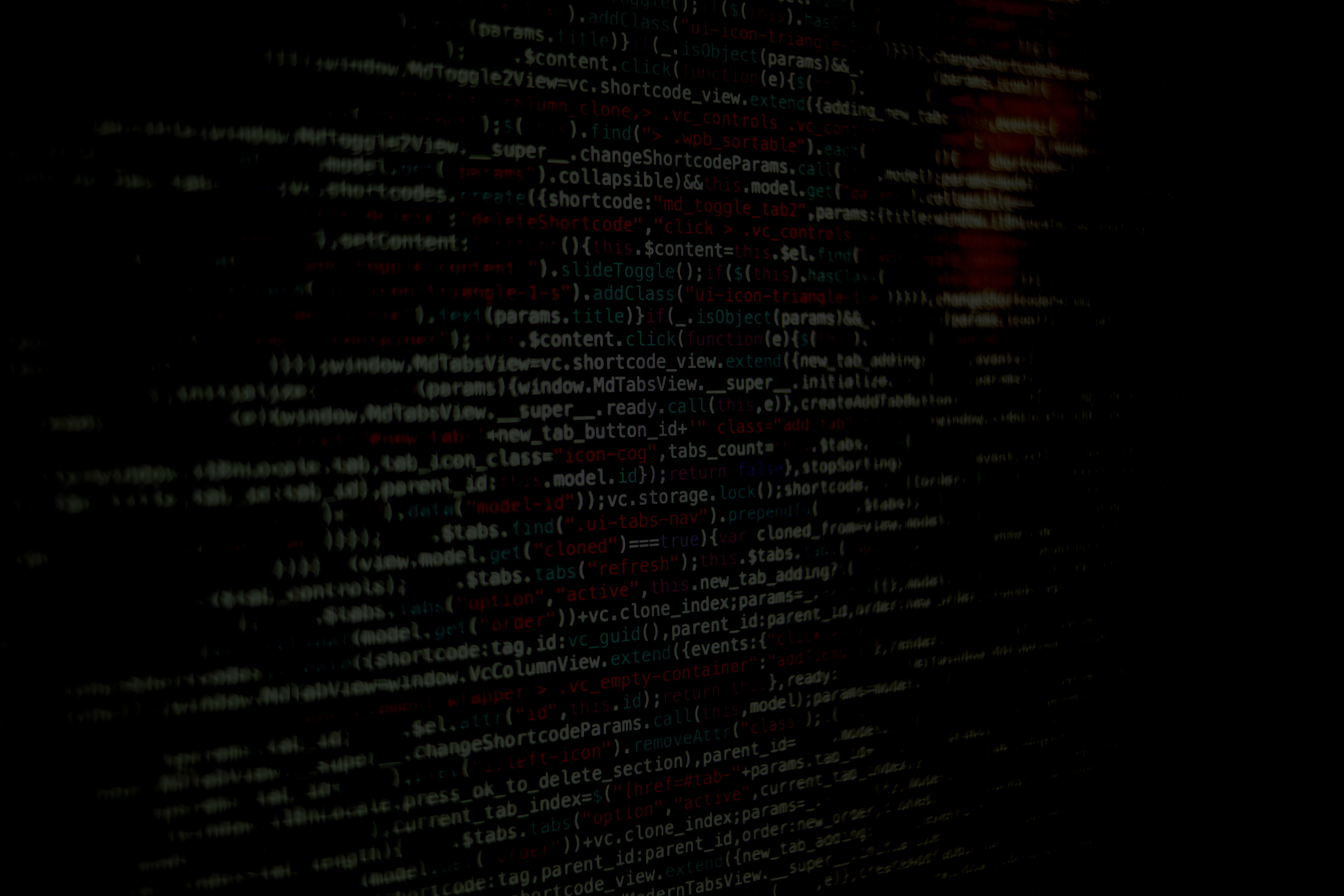


 )
)